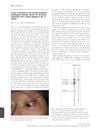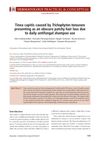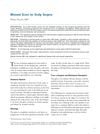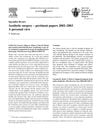 44 citations,
November 1998 in “Australasian Journal of Dermatology”
44 citations,
November 1998 in “Australasian Journal of Dermatology” Accurate diagnosis is key for treating different kinds of hair loss, and immune response variations may affect the condition and treatment results.
 37 citations,
May 1999 in “Australasian Journal of Dermatology”
37 citations,
May 1999 in “Australasian Journal of Dermatology” Early diagnosis and treatment are crucial for preventing permanent hair loss in various scalp conditions, and while new treatments are promising, more research is needed to evaluate their effectiveness.
 32 citations,
July 2011 in “Facial Plastic Surgery”
32 citations,
July 2011 in “Facial Plastic Surgery” New hair transplant methods offer more natural results and better graft survival, with ongoing research to increase donor hair options.
 27 citations,
November 2008 in “Facial Plastic Surgery”
27 citations,
November 2008 in “Facial Plastic Surgery” Follicular Unit Extraction is a less invasive hair transplant method with potential for natural results but has challenges like longer surgery time and higher cost.
 23 citations,
March 2001 in “Clinics in Dermatology”
23 citations,
March 2001 in “Clinics in Dermatology” Hair restoration surgery techniques have evolved, with focus on patient selection and realistic goals, and future advancements may include cloning and gene therapy.
 22 citations,
January 2018 in “Experimental Dermatology”
22 citations,
January 2018 in “Experimental Dermatology” The meeting focused on understanding, diagnosing, and finding treatments for irreversible hair loss diseases.
 20 citations,
July 2009 in “Journal of Pediatric and Adolescent Gynecology”
20 citations,
July 2009 in “Journal of Pediatric and Adolescent Gynecology” Quick treatment of hair disorders in teenage girls is important because of the emotional effects.
 18 citations,
June 2019 in “Clinical research in dermatology”
18 citations,
June 2019 in “Clinical research in dermatology” Acne can't be cured but can be managed with treatments like benzoyl peroxide and diet changes; it's costly and can lead to scarring and mental health issues.
 10 citations,
January 2018 in “Elsevier eBooks”
10 citations,
January 2018 in “Elsevier eBooks” Burn scars heal abnormally and more research is needed to find better treatments.
 9 citations,
November 2018 in “Drug Discovery Today”
9 citations,
November 2018 in “Drug Discovery Today” Using skin stem cells and certain molecules might lead to scar-free skin healing.
 9 citations,
September 1999 in “Journal of the European Academy of Dermatology and Venereology”
9 citations,
September 1999 in “Journal of the European Academy of Dermatology and Venereology” Skin ulcers from interferon may not depend on the amount given.
 8 citations,
November 2020 in “Optics and Laser Technology”
8 citations,
November 2020 in “Optics and Laser Technology” LED light therapy is effective for skin and hair treatments but requires careful use to minimize risks.
 7 citations,
February 2010 in “British Journal of Dermatology”
7 citations,
February 2010 in “British Journal of Dermatology” A woman with a rare autoimmune disorder had a blister on her eye and unique immune reaction, which was effectively treated with medication.
 6 citations,
January 2016 in “Journal of Stem Cell Research & Therapy”
6 citations,
January 2016 in “Journal of Stem Cell Research & Therapy” Notch1 signaling is crucial for improving wound healing and skin regeneration by affecting stem cell behavior.
 5 citations,
January 2023 in “Journal of the European Academy of Dermatology and Venereology”
5 citations,
January 2023 in “Journal of the European Academy of Dermatology and Venereology” Experts advise using sunscreen and proper skin care before, during, and after procedures to speed healing, prevent complications, and reduce scarring.
 5 citations,
January 2012 in “Hair therapy & transplantation”
5 citations,
January 2012 in “Hair therapy & transplantation” Hair mesotherapy might help with certain types of hair loss but lacks strong scientific proof and has some risks.
 4 citations,
June 2002 in “Clinical and experimental dermatology”
4 citations,
June 2002 in “Clinical and experimental dermatology” Effective treatment for hidradenitis suppurativa varies, with antibiotics commonly used and surgery as an option, but no single method is universally successful.
 2 citations,
October 2015 in “Primary Care: Clinics in Office Practice”
2 citations,
October 2015 in “Primary Care: Clinics in Office Practice” Doctors should diagnose hair loss by examining the patient and possibly doing tests, and then treat it based on the type, which may prevent permanent hair loss.
 2 citations,
April 2015 in “Dermatology practical & conceptual”
2 citations,
April 2015 in “Dermatology practical & conceptual” Daily use of antifungal shampoo can hide symptoms and make it hard to diagnose fungal scalp infections.
 February 2024 in “Frontiers in physiology”
February 2024 in “Frontiers in physiology” Modifying certain signals in the body can help wounds heal without scars and regrow hair.
 January 2024 in “RSC pharmaceutics”
January 2024 in “RSC pharmaceutics” Removing the outer skin layer increases drug absorption and offers non-invasive treatment options, with some methods allowing for quick skin recovery.
 October 2021 in “The Egyptian Journal of Hospital Medicine ”
October 2021 in “The Egyptian Journal of Hospital Medicine ” Combination therapies work better than single treatments for atrophic acne scars.
 October 2016 in “Elsevier eBooks”
October 2016 in “Elsevier eBooks” Common noncancerous skin diseases have various treatments, including topical applications, light therapy, surgery, and medications, with psychological support being important.
 July 2016 in “American Journal of Dermatopathology”
July 2016 in “American Journal of Dermatopathology” The meeting showcased rare skin disease cases, highlighting the need for accurate diagnosis and treatment.

Modern hair restoration techniques can effectively treat hair loss and provide natural-looking results.
 January 2010 in “Elsevier eBooks”
January 2010 in “Elsevier eBooks” The document concludes that different types of hair loss have specific treatments, and early diagnosis is crucial for preventing permanent hair loss.
 May 2007 in “Dermatologic Therapy”
May 2007 in “Dermatologic Therapy” Hair care practices like using relaxers and tight braiding can lead to permanent hair loss in black women.
 January 2007 in “Dermatologic Surgery”
January 2007 in “Dermatologic Surgery” A new scalp surgery technique leads to significantly thinner scars.
 June 2005 in “British Journal of Oral & Maxillofacial Surgery”
June 2005 in “British Journal of Oral & Maxillofacial Surgery” Advancements in aesthetic surgery from 2002-2003 include improved skin resurfacing, effective migraine surgery, satisfying hair transplants, alternative treatments for skin nevi, successful endoscopic midface enhancement, and safe techniques for facial rejuvenation.
 May 2019 in “Journal of the Dermatology Nurses’ Association”
May 2019 in “Journal of the Dermatology Nurses’ Association” Folliculitis decalvans mainly affects middle-aged African American men and is treated with antibiotics.






























